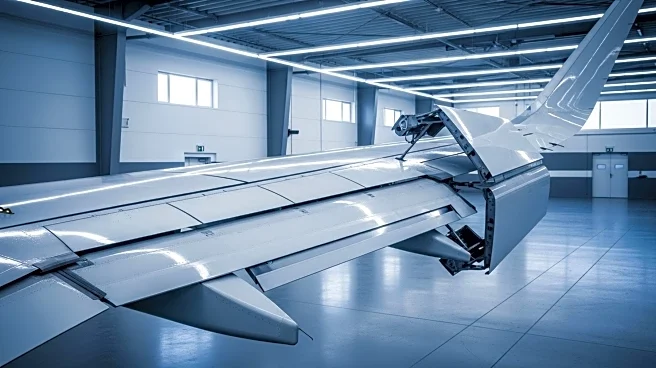What's Happening?
Boeing's 777X aircraft features innovative folding wingtips designed to address the challenge of fitting into existing airport infrastructure. The 777X's wingspan extends to 235 feet, longer than a Boeing 747, due to advanced carbon-fiber construction that enhances fuel efficiency and range. However, most airport gates were not built to accommodate such wide wings. To solve this, Boeing engineered a system allowing the outer 11 feet of each wing to fold upward while on the ground, enabling the aircraft to fit into the same parking spots as older models. This technology is groundbreaking for commercial aviation, prompting the Federal Aviation Administration (FAA) to establish new certification rules. Despite the innovation, the 777X's entry into service has been delayed from its original 2020 timeline to 2025 due to technical and regulatory hurdles, including the complexity of the folding wingtip system and additional scrutiny following the 737 MAX incidents.
Why It's Important?
The folding wingtips of the Boeing 777X represent a significant advancement in aircraft design, offering airlines the ability to operate larger, more efficient planes without necessitating airport infrastructure changes. This innovation is crucial for airlines facing rising fuel costs and environmental pressures, as the 777X promises to be 10% more fuel-efficient than its competitors. The ability to fit into existing airport standards without special accommodations allows airlines to maximize operational efficiency and reduce emissions, aligning with sustainability goals. The delays in the 777X's service entry highlight the challenges of integrating new technologies into commercial aviation, but the potential benefits for airlines and the environment underscore the importance of overcoming these hurdles.
What's Next?
Boeing continues to conduct extensive ground and flight testing of the 777X's folding wingtips, ensuring reliability and safety before the aircraft enters commercial service. Major airlines such as Emirates, Lufthansa, and Qatar Airways are anticipating the 777X to modernize their long-haul fleets. The successful implementation of this technology could set a precedent for future widebody jets, with other manufacturers like Airbus exploring similar concepts. As the aviation industry seeks greater efficiency and sustainability, adaptable wing designs may become more common, potentially influencing future aircraft development and airport planning.
Beyond the Headlines
The introduction of folding wingtips in commercial aviation could lead to broader implications for aircraft design and airport operations. As airlines and manufacturers prioritize efficiency and environmental impact, innovations like the 777X's wingtips may drive a shift towards more adaptable and sustainable aviation solutions. This technology not only addresses immediate logistical challenges but also contributes to long-term goals of reducing emissions and operational costs, benefiting both the industry and the environment.









